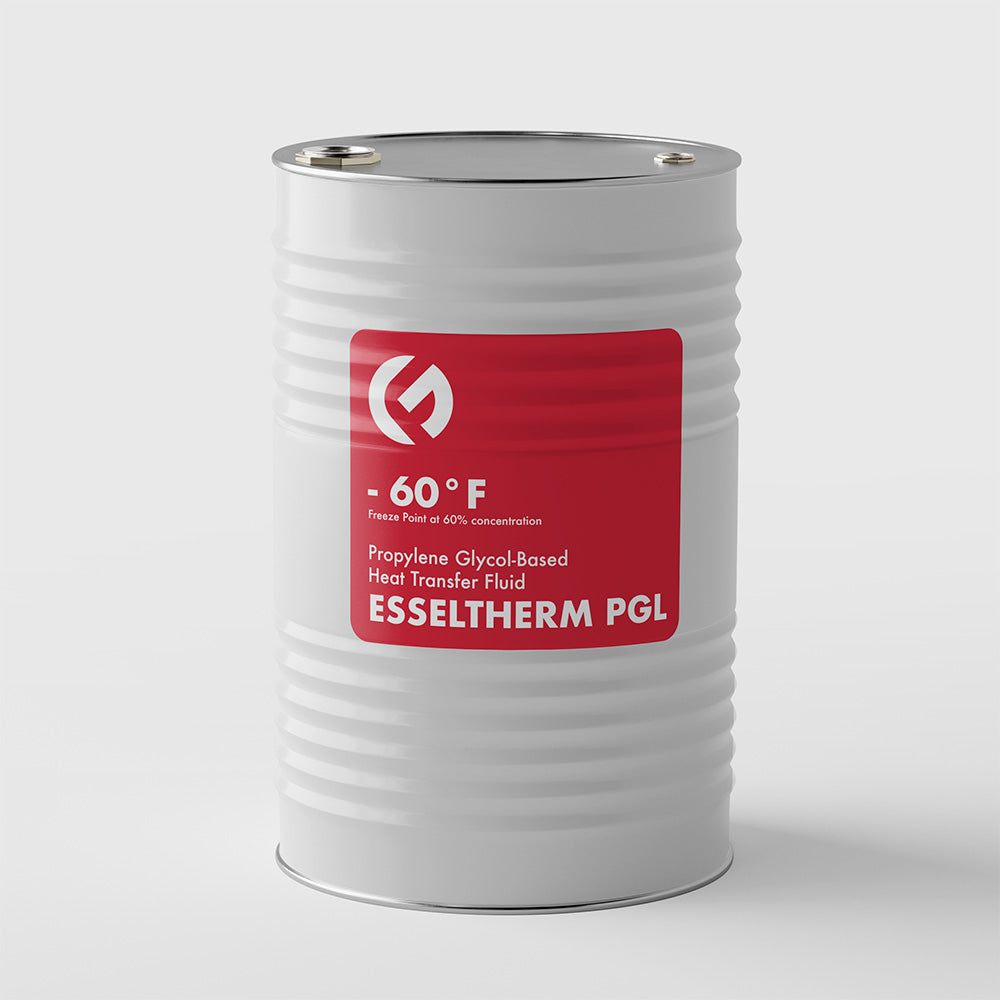Propylene Glycol-Based Heat Transfer Fluid ESSELTHERM PGL
Propylene Glycol-Based Heat Transfer Fluid ESSELTHERM PGL
Overview
ESSELTHERM PGL is a high-performance, propylene glycol-based heat transfer fluid engineered for applications requiring a low-toxicity solution to meet environmental regulations and legal requirements for propylene glycol use. With an operating temperature range from -60°F to 320°F (-51°C to 160°C), it is ideal for single fluid heating and cooling systems across various industries.
Freezing Point: -51°C (-60°F) at 60% concentration
Composition: Propylene Glycol
Inhibition: Fully inhibited (also available in PGL-FG food grade)
Application: Single fluid heating and cooling

Request a quote
Please provide as much detail as possible about your application and technical requirements, so we can offer the best solution for your needs.
Advanced Inhibitor Package
ESSELTHERM PGL contains industrial-grade corrosion control inhibitors specially formulated to extend fluid service life and reduce maintenance needs. The inhibitor package includes:
- Phosphate
- Boron
- Nitrite
- Tolyltriazole (TTZ)
These inhibitors provide robust protection for both ferrous and non-ferrous metals such as brass, copper, copper alloys, steel, cast iron, and aluminum. By preventing corrosion, scaling, and other harmful fouling, the fluid ensures optimal system performance and longevity.
Key Benefits
-
Reduced Maintenance
Advanced inhibitors offer a higher level of reserve alkalinity, resulting in fewer maintenance requirements through re-inhibiting.
-
Versatile Applications
Ideal for demanding applications including HVAC systems, cold storage equipment, vapor recovery systems, and more.
-
Low Toxicity
Being propylene glycol-based, ESSELTHERM PGL is less toxic than ethylene glycol coolants, making it safer for environments where human or environmental exposure is a concern.
What Is Propylene Glycol?
Propylene glycol is a synthetic organic compound with the chemical formula C₃H₈O₂. It is a colorless, odorless, and slightly viscous liquid that is hygroscopic and fully miscible with water. Due to its low toxicity and excellent heat transfer properties, propylene glycol is widely used in applications where safety and environmental considerations are paramount.
Food Grade Option: ESSELTHERM PGL-FG
For applications that require food-grade standards, we offer ESSELTHERM PGL-FG. This food grade propylene glycol variant is suitable for industries such as food processing and pharmaceuticals, where incidental contact with products may occur. It meets stringent safety regulations without compromising on performance.
Propylene Glycol in Antifreeze
Propylene glycol is a key component in many antifreeze formulations due to its ability to lower the freezing point of water. Unlike ethylene glycol, propylene glycol is less toxic, making it a safer alternative for applications where human or environmental exposure is a concern. Its use is often mandated by law in sensitive industries to ensure safety.

Environmental Responsibility
ESSELTHERM PGL is readily biodegradable and does not accumulate in water systems, minimizing environmental impact. However, large-scale contamination should be avoided as rapid oxygen depletion may occur, potentially affecting aquatic life.
Propylene Glycol Uses
- Heat Transfer Fluid: Commonly used in heating, ventilation, and air conditioning (HVAC) systems for its efficient thermal conductivity.
- Antifreeze Propylene Glycol: Acts as an antifreeze agent in cooling systems, preventing freezing in low-temperature environments.
- Food Industry: Utilized as a food grade propylene glycol in food processing, pharmaceuticals, and cosmetics as a solvent, humectant, and preservative.
- Industrial Applications: Employed in chemical manufacturing processes and as a base for producing unsaturated polyester resins.
FAQ
Where to Buy Propylene Glycol-Based Coolants?
ESSELTHERM PGL is available directly through Esseltherm's distribution network. Whether you're looking for standard formulations or food grade propylene glycol, we have the right solution to meet your needs. Contact us to discuss your specific requirements and learn how ESSELTHERM PGL can enhance the performance and longevity of your thermal systems.
Why Choose ESSELTHERM PGL?
- Safety First: Low toxicity levels make it safer for personnel and the environment, aligning with health and safety regulations.
- High Performance: Offers superior thermal stability and efficient heat transfer across a wide temperature range.
- Longevity: Advanced inhibitors extend fluid life and protect against corrosion and scaling, reducing downtime and maintenance costs.
- Versatility: Suitable for a multitude of applications, from industrial processes to sectors requiring food-grade solutions.
Antifreeze Propylene Glycol vs. Ethylene Glycol
While both propylene glycol and ethylene glycol are used in antifreeze and coolant applications, there are important distinctions:
- Toxicity: Propylene glycol is considerably less toxic than ethylene glycol, reducing health risks in case of accidental ingestion or exposure.
- Environmental Impact: Propylene glycol is more environmentally friendly due to its biodegradability.
- Performance: Ethylene glycol offers slightly better heat transfer efficiency, but propylene glycol's safety advantages often make it the preferred choice.
Understanding these differences is crucial for selecting the appropriate coolant for your system. ESSELTHERM PGL provides a balanced solution with excellent performance and enhanced safety.

